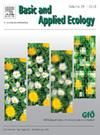Ecological assessment of forest management approaches to develop resilient forests in the face of global change in Central Europe
IF 3.5
2区 环境科学与生态学
Q2 ECOLOGY
引用次数: 0
Abstract
The effects of global change pose major challenges for both practical forest management and forest ecological research if European forests are to be managed in such a way that they can continue to provide their many services to people in the future. The number of studies on impacts of global change on forest ecosystems has increased enormously over the last decade, but the evidence on how to improve the resilience and resistance of forests is of varying quality and in some cases contradictory. For that reason a group of experts from the Ecological Society of Germany, Austria and Switzerland (GfOe), Section Forest Ecology decided to review the relevant scientific information and to assess its degree of confidence to provide guidance for future forest adaption options. Our review of research on the impact of global change on European forests and associated forest management strategies to adapt forests identified 35 scientific statements that were grouped into the following thematic priorities: (1) selection of tree species and promoting diversity, (2) genetics, (3) forest structures, (4) forest functions, ecosystem services and nature’s contribution to the lives of people, (5) silvicultural systems, (6) natural regeneration, successional processes and wildlife management, and (7) future research and monitoring methods. Our analyses showed that most of the statements reflect validated research findings. However, many of them were incomplete and would not yet allow transfer to broad application in the form of silvicultural adaptation strategies. Future studies should focus on the identification of climate-resilient tree species and provenances, their regeneration processes and their resistance to pathogens and pests under drought conditions. Species- and site-specific scientific findings must be translated into silvicultural techniques/measures such as the determination of tree species mixtures, thinning and harvesting intensities and tree regeneration methods. We identified significant gaps in the application of forest monitoring practices needed to obtain reliable information on the provision of ecosystem goods and services. This review provides a comprehensive basis to develop a roadmap for future forest adaptation research to improve our level of confidence for science-based management recommendations.
在中欧面临全球变化的情况下,对森林管理方法进行生态评估,以发展具有复原力的森林
如果要对欧洲森林进行管理,使其将来能够继续为人们提供许多服务,那么全球变化的影响将对森林的实际管理和森林生态研究提出重大挑战。在过去十年中,关于全球变化对森林生态系统影响的研究数量大大增加,但关于如何提高森林的恢复力和抵抗力的证据质量参差不齐,在某些情况下是相互矛盾的。因此,来自德国、奥地利和瑞士生态学会(GfOe)森林生态科的一组专家决定审查相关的科学信息,并评估其信心程度,以便为未来的森林适应方案提供指导。我们审查了关于全球变化对欧洲森林的影响和适应森林的相关森林管理战略的研究,确定了35项科学声明,这些声明分为以下主题优先事项:(1)树种选择和促进多样性;(2)遗传学;(3)森林结构;(4)森林功能、生态系统服务和自然对人类生活的贡献;(5)造林系统;(6)自然更新、演替过程和野生动物管理;(7)未来的研究和监测方法。我们的分析表明,大多数陈述反映了经过验证的研究结果。但是,其中许多是不完整的,还不能以造林适应战略的形式广泛应用。未来的研究应集中在气候适应性树种和种源的鉴定、它们的再生过程以及它们在干旱条件下对病原体和害虫的抗性。特定物种和地点的科学发现必须转化为造林技术/措施,例如确定树种混合、间伐和采伐强度以及树木再生方法。我们确定了在应用森林监测实践方面存在的重大差距,这些实践是获得关于提供生态系统产品和服务的可靠信息所必需的。本综述为未来森林适应研究路线图的制定提供了全面的基础,以提高我们对基于科学的管理建议的信心水平。
本文章由计算机程序翻译,如有差异,请以英文原文为准。
求助全文
约1分钟内获得全文
求助全文
来源期刊

Basic and Applied Ecology
环境科学-生态学
CiteScore
6.90
自引率
5.30%
发文量
103
审稿时长
10.6 weeks
期刊介绍:
Basic and Applied Ecology provides a forum in which significant advances and ideas can be rapidly communicated to a wide audience. Basic and Applied Ecology publishes original contributions, perspectives and reviews from all areas of basic and applied ecology. Ecologists from all countries are invited to publish ecological research of international interest in its pages. There is no bias with regard to taxon or geographical area.
 求助内容:
求助内容: 应助结果提醒方式:
应助结果提醒方式:


